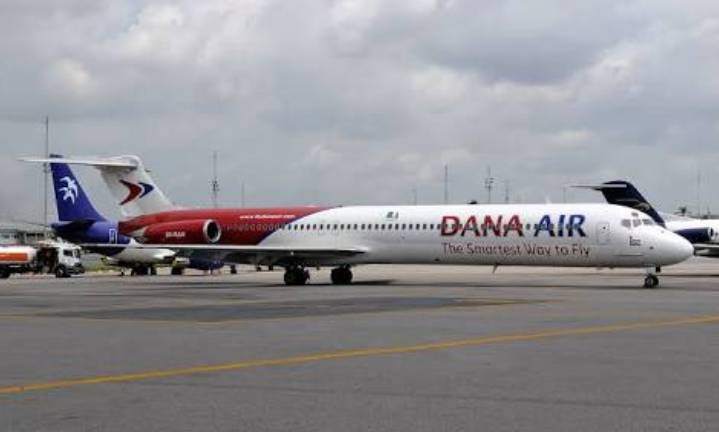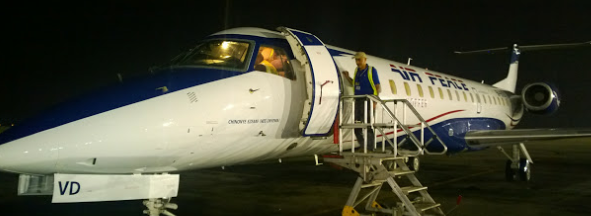Aviation consultant in Nigeria, Chris Aligbe has kicked against the proposal by the CEO of Asset Management Corporation of Nigeria (AMCON), to the national assembly to float a National Carrier, merging Arik and Aero airlines, rather than starting a brand new one, which has been ongoing for the last four years.
This suggestion made by Ahmed Kuru during his budget defence has, as expected, elicited a flurry of comments and interventions by well-meaning industry analysts and stakeholders; with some supporting AMCON’s position and others opposing it.
Before now, the challenge was that many stakeholders were not convinced of the need for a new national carrier. But stark realities of our national losses in terms of humongous capital flight of over US$1.3billion annually on ticket sales alone by foreign airlines as well as the fact that countries like Uganda, Tanzania and Ghana, even Republic of Benin are set with the floatation of their national carriers with varying degrees of government equities have undermined the position of some stakeholders who hitherto argued that national carriers are now out of fashion.
This, coupled with the fact that, try as they may, the collective operational strength and effort of our domestic airlines has proven grossly inadequate, albeit, unable to provide any anchor for redemptive hope.
And so today, virtually the entire industry and, indeed, the vast majority of stakeholders are either clamouring for or desirous of a befitting national carrier.
At least now, after many years of cacophony of clanging ideas, we have moved a step or two forward towards the quest for redemptive action in the airline sub-sector. We are no longer arguing whether or not, but rather, what will be the nature of the desired national carrier. Even AMCON, whose authorities did not support the idea when it acquired Aero and Arik, today, wants to key into the idea, though to achieve a corporate, rather than national motive.
There are still a few who believe that Aero and Arik are airlines that belong to the government. It is not true. If they were, they would be under Aviation not AMCON that has no statutory responsibility on aviation but rather on debt collection. Any attempt to move outside this statute will occasion international litigations that could be unresolved for many years. This is because both the original owners and creditors will head to court to challenge the Federal Government.
Even the idea of merging two airlines which the proponents have acknowledged “are not doing well” to form a new national carrier is fraught with so many intractable challenges that will make the product a disaster abinitio. Some of those include, but not limited to the following pertinent questions.
– Can any healthy and virile establishment be founded on the back of unhealthy and struggling entities?
– Will any sensible investor invest in such establishment?
– – Where no investors come, such a national carrier will exist on 100% government equity, just like the liquidated Nigeria Airways.
– Have we so soon forgotten the bane of Nigeria Airways?
– Can AMCON’s liabilities from Aero and Arik, vicariously or inferentially, be assigned simplicter to the Federal Government? Ditto the assets?
If not, then the argument of Federal Government owning two airlines – Aero and Arik fails to sail.
Have AMCON and Supporter – Proponents stopped to consider the “Outline Business Case” (OBC) of its proposition on the use of Aero-Arik merger to float a national carrier? I ask this because in our present dispensation, all such Proposals/Promoters must first submit an OBC to the Infrastructure Concession and Regulatory Council (ICRC) for evaluation, guidance and approval. For those who are not aware, the Nigeria Air national carrier project had gone through this process, passed two to three approvals by the Federal Executive Council (FEC), successfully concluded the Development stage and was at the Procurement stage in compliance with ICRC approvals and guidance.
In the entire three-year period of due process, Arik and Aero were never in consideration. AMCON’s proposal is therefore an unnecessary distraction at best and, at worst, an uncanny step to truncate the Nigeria Air Project. Kuru took his proposal to the National Assembly, having failed to secure consent from the Ministry of Aviation. Was it in good faith? Or an attempt to arm-twist? Any which way, the NASS has no statutory/constitutional right to compel the Ministry’s acceptance of Kuru’s fantasy. I wish public officials should know and act within statutes. Kuru’s push is outside the oversight role of the NASS.
I had thought that many a commentator, particularly the Support-Proponents of AMCON should have asked few questions based on Ahmed Kuru’s statement that “Arik is now positioned for profitability”.
First, is Kuru sincere in his avowal? What are his indices of Arik’s profitability? AMCON took over Arik with 15 aircraft. How many aircraft has the airline now? What is the debt profile of Arik as at today? How much has AMCON recovered since it took over Arik. What is the operational status of Arik in terms of route network and schedule integrity? What about maintenance integrity which Arik had the highest rating on before AMCON’s takeover?
We can ask on and on. But suffice it to remind us that at the time of takeover, AMCON was not only loud, but also voluminous with words in its effort to convince Nigerians on the way of Arik’s takeover. Every day, the deluge of information and “facts” of Arik’s indebtedness were deafening as they poured out like the unceasing sound of a pounding cataract.
AMCON cannot therefore just take us for a ride by telling us at the National Assembly that “Arik and Aero are now positioned for profitability”.
AMCON should publish its score-card to show the “great success” it has achieved so we can clap for it. I dare AMCON to do so because, as at today, what is known is that Aero is keeping faith and in about four years’ time, its close to N30billion outstanding debt will be paid off while Arik is not anywhere close.
I am not surprised because as at when AMCON took over Arik and Aero, in all my public and media engagements, I described AMCON as an “undertaker” that had no modicum of competence and neither developmental vision nor growth plan to turn the airlines around.
AMCON, in exercise of its statutory responsibility, applied the classic, albeit, the simplistic takeover model with features of general principles – seek court order, announce take-over, appoint Receiver-Manager, sack Management and replace CEO with its own appointee.
Unfortunately, airlines are much more complex as they usually require a much more in-dept study and understanding of their state and what is required to enable the achievement of required objective(s). Airlines in the states of Aero and Arik at the time of AMCON takeover, first and foremost, required a turnaround.
And since AMCON does not possess, and is not expected to possess turnaround competence for complex organizations like airlines, AMCON, knowing this, should have engaged renowned firm of Consultants or Turnaround Management Team to engineer their quick (usually 5 years) turnaround. If AMCON had taken this road, it would have found that at the time of take-over, Aero exhibited more turnaround symptoms than Arik, despite the fact of by “far larger volume of Arik’s debt”.
Aero required a complete turnaround in every material particular; from Management, equipment, market share/positioning, work culture/morale, operational integrity, rundown facilities, safety standards, declined assets overall and impaired and mutilated vision arising from internal (Ownership-Management) wrangling.
Arik on the other hand, was not a candidate for a holistic turnaround. This is because, although Arik was plagued, like Aero with all the afflictions (external and internal, most cases self-inflicted), ailments that over the decades have been and are still, the bane of airline operations in Nigeria, Arik had great assets, healthy and modern facilities, very young fleet, world standard maintenance and safety records as well as a vision that was not disjointed.
Unlike Aero, what Arik needed was a laser beam on Management, Corporate governance and work culture that would appropriate all the positives to reverse the negatives. I have no doubt that both Captains Roy Ilegbodu and Ado Sanusi are doing their best at Arik and Aero respectively.
All that I am saying is that if AMCON had studied the turnarounds of post-apartheid South African Airways by Coleman Andrews and his team, the post-Privatisation of Kenya Airways by Speed-wing, the IFC approach to pre-Privatisation of Nigeria Airways and the British Airways pre-Privatisation turnaround by the Lord King/Collin Marshal team, it would have understood the superiority of a Turnaround Team to classic use of Receiver Manager/CEO model. When I raised objections to AMCON’s approach in its take-over of Arik and Aero, I was not speaking apriori because I had seen how AMCON managed the assets of Virgin Nigeria/Nigerian Eagle after acquiring its N35billion debt. Its assets were left to rot away.
Today, AMCON has not publicly rendered any account on that take-over. Yet, it is public funds, albeit, taxpayers’ assets and money. Is it not thought-provoking and informative to us – Aviation Stakeholders – that even at the time Kuru was trying to push its burden of Arik and Aero to Sirika, he was already working with Ernst and Young, CBN and NDIC for the liquidation of AMCON? Kuru in a just-concluded retreat told the House Committee on Banking and Finance just last week that of the 12,743 Eligible Bank Assets (EBAs) AMCON bought over which brought the Banks Net Book Value (NAV) to zero, only 4000 EBAs have been resolved while 8000 remain unresolved. He further confirmed that 71 of them are under receivership, which no doubt include Arik and Aero as we know. AMCON has only achieved about 31% of its assigned role.
It is hoped that if the CBN and NDIC buy over AMCON’s N6.3trillion debt and sell it off internationally at a discounted rate as proposed by Kuru, then Arik and Aero may come fully alive again and become formidable. This will be great since our country is in dire need of at least 3 to 4 virile airlines to cope with the SAATM and the travel requirements of our people.
Given the above position, it is therefore intriguing why Kuru was pushing his idea of Arik-Aero-based national carrier. I am sure by now Supporter-Proponents of Kuru’s unconvincing and unflyable kite know better.
My simple advice to the Minister of Aviation is to just ignore Kuru and his AMCON and move on. The only and major success of AMCON as an institution has been to give the banks a debt-clean slate. Since CBN and NDIC can do this better, AMCON is an unnecessary and poor duplication. It should be wound up.
Chris Aligbe, Aviation Consultant.




